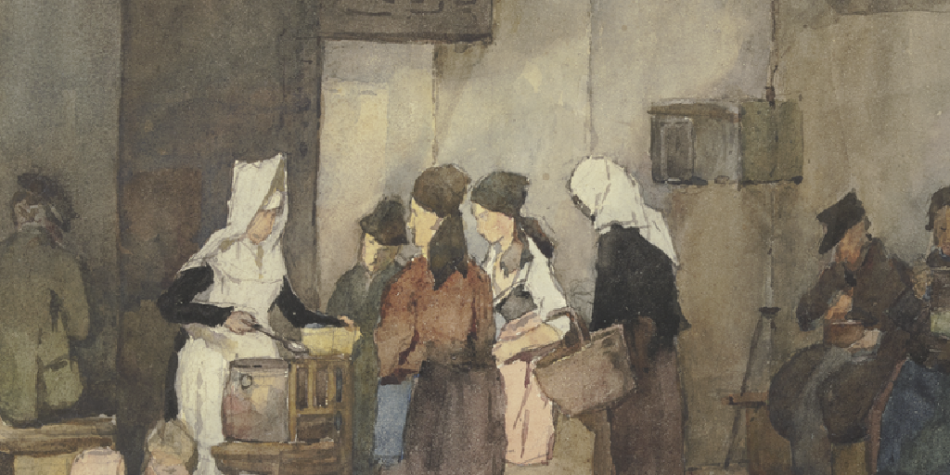At every Christmas season, I commit some time to reflect on life’s blessings over the years, and the many gifts I’ve received from God, His Son Jesus, and people who’ve made my life meaningful. This year has been especially poignant because of the recent untimely death of our 42-year-old son, Ryan. In my work around the globe among the world’s poor, I’ve seen a great deal of death, disease, and suffering. But when it’s in your own family, it becomes more painful than perhaps otherwise.
Yet during this sacred week we’re just finishing, as we reflect and evaluate, I’ve remembered so many people who have become mortal angels who’ve inspired and labored with me to reduce sorrow and human suffering, both locally and globally. I can’t pick a single individual only. But together, we’ve learned and worked around the world over decades. I believe our collaboration is an exciting testimony of how believers in Christ can uplift the poor and improve society today.
Our approach is not what the institutional Church of Jesus Christ of Latter-day Saints may officially do. Nor is it about the things that government programs, the World Bank, the United Nations, Big Business, and others can accomplish. But I believe our collaboration is an exciting testimony of how believers in Christ can uplift the poor and improve society today. We can each become a blessing to others as we focus on what Jesus taught—that we, like Him, should “go about doing good.”
In this dialogue on practical Christianity, I will share examples of associates I’m blessed to serve with who establish private humanitarian initiatives as they collectively see social needs around the globe and respond by reaching out with both faith and action. In the process, many are becoming angels serving others every day. We’re inspired by the Apostle Paul: “Wherefore lift up the hands which hang down and the feeble knees; And make straight paths for your feet, lest that which is lame be turned out of the way; but let it rather be healed.”
I will build off this idea about ways each of us may become a source of blessing others by sharing mini stories about a number of global humanitarians with whom I’ve labored. In some instances, they felt motivated by events, saw people’s suffering, and felt determined to lessen the pain of those in this world of toil and trouble. Quite frequently they go unappreciated or unremarked-on. Instead, they make quiet commitments to design and carry out humanitarian efforts, often in far-flung corners of the world, and often in the face of tremendous odds, they go ahead and do them.
An example of such an angel is my old friend, Addie Fuhriman, with whom I served in a BYU stake young adult program years ago. She asked if I would be willing to help her and others laboring to reduce human suffering in West Africa. I agreed and joined the Ouelessebougou Alliance board of trustees, which included Elder Marion D. Hanks of the presidency of the Seventy at church headquarters, Sister Chieko Okazaki of the general Relief Society presidency, and others. This alliance, often simply called “OA,” was begun in the 1980s by a Utah group of Catholics, Latter-day Saint folks, and Muslims, including my friend, Addie. Their goal was to develop a long-term socioeconomic relationship with people living in a group of 30 villages in Mali, an African country that at the time was the third-poorest nation in the world.
OA undertakes projects requested by the villagers, who define their own needs, contribute labor to projects, and provide leadership from their own ranks. Projects include constructing wells in a country suffering a 30-year drought, planting and fencing off gardens, providing basic health care training, teaching literacy, and establishing a village bank, along with various microenterprises and producer cooperatives. Through the years since, my life has been blessed by laboring with Addie and others among some of the poorest families on the planet, as well as serving and partnering with Latter-day Saint influencers. Addie became a lifelong humanitarian. Her initial request for me to assist was a blessing in my life that my wife and I, as well as our children, have benefited through decades of travel and volunteering among the poor in West Africa.
Different Ways to Reach the Need
As I see it, those of us who are believers in the scriptures and teachings of Latter-day Saint prophets and apostles can each become global ministers by providing humanitarian service in three principal ways. First are the traditional church programs, such as paying tithes, making personal offerings, going abroad as a group, or even serving as international missionaries in a needy African country, for example. I’ve come to believe that this kind of service should be our top priority—offerings that we give to bless the poor.
A second area of outreach and humanitarian assistance can be provided through partnering with other institutions. Church programs like Latter-day Saint Charities, the Perpetual Emigration Fund, regular church welfare, self-reliance services, and more can join forces with other noble causes. In this way, friends from other faiths may benefit from our work, as President Dallin Oaks admonished in a recent General Conference. Religious groups like the Adventists’ ADRA, Catholic Relief, and the Muslim Relief Society, as well as various other outreach efforts, can help us bless our neighbors in need as global ministers, also.
The third category, and the one I will primarily describe in this paper, is that of our engaging in individual acts of consecration and stewardship as contemporary Christian servants to the poor. These are what we might refer to as personal initiatives—not through our own church’s programs as an organization alone, but rather through the inspiration that comes when we pray about how we might help those around us or when we see on the nightly news the devastation impacting a community, region, or a country. Even our own neighbors right next door and others who might suffer and struggle in our community deserve our financial support, illustrated by the past months of horrific destruction and death from hurricanes in the South, this week’s massive snowstorms hitting much of the country, and other natural disasters that have recently torn up regions of the United States. I might add that I believe it is crucially important that we engage in these kinds of activities locally, not merely globally, because those suffering in circumstances around us typically affect our own lives, and thus we can affect their lives much more easily, more rapidly, and with fewer costs, than we can affect people globally. However, in this article, I will specifically emphasize international humanitarian initiatives.
Illustrations of Angelic Practice
I believe that becoming something like “Ministering Angels” on the ground empowers us to provide individual acts of consecration and stewardship, the kind that demonstrate a complementary path of service alongside large organizations or the institutional outreach–even “noninstitutionalized” acts of service to the poor, as President Gordon B. Hinckley encouraged us (p. 459).
We may consider these types of angels (or believers) to be unsung heroes—individuals doing wonderful work to bless the lives of others while not demanding recognition for their work. Such faithful Christian disciples are those having characteristics such as being self-starters who don’t wait to be commanded. They take action when they see a problem. They are inspired by something they feel inside. They are not motivated by external rewards, pressure, or recognition. Rather, their angelic services come from pure and authentic motives.
Another person I know who is a kind of ministering angel is Cecile Pelous, who, when she was stake Relief Society president in Paris, decided to launch an orphanage and asked me to help. She founded First Hope, an orphanage and school in Nepal. She started taking summer vacations to Nepal, leaving her prestigious job with the high-fashion industry in France to volunteer by helping abandoned children high in the Himalayas. Later she accumulated the funding to build her first orphanage and eventually left her job of luxury to operate a home and school that developed a better future for the local children. Some 20 years later, this angel, Sister Pelous, is still dedicated to her simple yet amazing program.[ref num=”1″]
The capacity for us to become angels as followers of Christ in changing the world is limitless, I sincerely believe. Yet far too often in our society, we do not fully appreciate those who live their faith. I reflect on the inspiring words of the Apostle Paul, who seems to invite us to become angels in service to others: “Watch ye, stand fast in the faith, quit you like men, be strong. Let all your things be done with charity.”
Over my years of working, teaching, and consulting in my chosen vineyard with the poor, I’ve met many faithful Latter-day Saint angels who have developed what I refer to as social entrepreneurial acumen—the capacity to see problems and then take action. Many draw on business and other training to establish nonprofit start-ups of what are called nongovernmental organizations, or NGOs. As I have been privileged to be a part of growing that movement, I see a powerful trend that, in some ways, I would argue is far more important and ultimately will give us better recognition as Christians than would the typical for-profit business start-up or other means of wealth generation.
Instead, I think what we are seeing now is the flourishing of the means for building civil society. These include private voluntary organizations (PVOs), nongovernmental organizations, and third-sector institutions that are having an enormous impact in benefiting the lives of the poor around the globe. Many such angels have launched initiatives in the past several decades acting as “social entrepreneurial” Christians drawing on their faith, relying on their values, harnessing their educations, and calling forth their business skills in designing and launching effective humanitarian services strategies. We see in the preceding illustrations of Addie Fuhriman and Cecile Pelous growing efforts by Latter-day Saint members within the U.S., outside the U.S., and across the world in Latin America, in Africa, in Asia, who are starting their own similar programs, drawing on that same faith, and as a result achieving significant impacts for good.
Another illustration of this is a Latin American Peruvian student of mine, Jaime Figueroa, who was in my Master of Public Administration course I was teaching for the Romney Institute of Public Service and Ethics at BYU. He asked the class and me to help him organize a nonprofit foundation serving the poor of Peru, especially in the Sacred Valley of the ancient Inca region. A group in the class and I began designing and implementing a new nonprofit, now called Eagle Condor Humanitarian, as a 501(c)(3) nonprofit corporation working mostly in the Andes region of South America. This foundation works with local civic and religious leaders through projects that will empower impoverished villagers to acquire for themselves what they need and even want so that they will raise their own standard of living and have a more fulfilling life. With a variety of projects, volunteers work in several areas, including agro-industry, education, health, hygiene, housing, water, family gardens, small enterprises, microcredit, job and vocational training, and English and computer classes.
Started by Jaime, the mission of Eagle Condor is to enrich family life, empower people, and build self-reliance. Its purposes include offering Peruvian employment opportunities, working out ways of raising the standard of living, and offering basic humanitarian charity. Our goal has been to build an ongoing organization that would improve the lives of the meek and the humble in Peru. Eagle Condor drew for its value statement on Latter-day Saint religious teachings that remind us we are all sons and daughters of God and must reach out to one another with love and concern. In this angelic enterprise, lifting the sorrow and suffering of those who are in distress is made possible by U.S. followers of Jesus who give financial and other resources such as skills and talents that rise out of people’s generosity.
Other ministering angels I collaborate with have primarily been students, most of them alumni of BYU or alumni of other schools. Also, my colleagues have reached out for volunteers beyond academia, such as homemakers, retirees, artists, businesspeople, school teachers, CPAs, musicians, and lawyers. In all our work, we try to use gospel principles, defining” charity,” the very term which comes from old words for “Christian love,” to help the poor and elevate them in such a way that they may help themselves and in turn can begin to help others. So, it’s this notion of a beneficial ripple effect. It’s not a hand-out but a hand-up. It’s not building dependency and giving out things and goods. It’s not a form of creating a culture of wanting more and living passively while charity and relief simply continue to flow to the recipients. Rather, the Latter-day Saint ministering that my angelic friends seek consists of helping people learn principles and develop systems so that they may empower themselves and then reach out and empower others.
Why are such humanitarian “angels” needed today? Because the reality is that a great many people on the face of this earth are suffering. Over two and a half billion of them—or almost half the world’s entire population—live on less than $2 a day. And over one billion live on less than a single dollar a day. It is clear to experts that critical needs are not being met by the enormous systems and large institutions, whether they be governments or the UN, or the International Red Cross. And the reality is that even if we gave away all the money we have as a country that it still wouldn’t solve the problems of the billions of poor people. Churches could give away all of their funds, but that, too, wouldn’t solve the problem. The challenge is to learn how we can be practicing angels by using capital—whether financial, human, or organizational—to build a better world and to address these terrible problems that the poor face around the globe and, by doing so, help them lift themselves up.
Hopefully, these brief stories I’ve described suggest what Joseph F. Smith taught over a century ago: that “a religion which has not the power to save people temporally and make them prosperous and happy here, cannot be depended upon to save them spiritually, to exalt them in the life to come.”[ref num=”2″] This great prophet shows that we are to become angels by helping the poor here and now, not just later in heaven.
Perhaps one inspiring, final case from my experience will help conclude this matter. It involves my associations with a group of successful Latter-day Saint “ministering angels” who enjoy considerable business success and wealth. Friends like Bob, Joseph, Mike, and Tim approached me, saying they’d read my book, Working Toward Zion, and wanted to collaborate in empowering poor communities. I told them they were “angels in disguise” because, just previously, I’d had some requests from Mexico and India for economic assistance. Ultimately, we recruited other successful associates formally known as “angel investors” and launched a new nonprofit we called Unitus. The name meant we were going to “unite-us” as a human family by trying to practice the Law of Consecration and Stewardship among impoverished regions of the world. Raising tens of millions of dollars in its first several years, Unitus generated amazing impacts in dozens of nations. Encouraged by President Gordon B. Hinckley and several other General Authorities, my friends and I believed that greater global unity among people was possible by helping our sisters and brothers in lasting ways through socioeconomic self-reliance.
Conclusions
I believe these mini-cases offer glimpses of the many ways in which believers in Christ can utilize their God-given talents to carry out what the Church teaches. The scriptures show us how we can each become “Everyday Angels.” Better yet, “Every Year Angels” or Lifetime Angels.” Such individuals practice the Lord’s own teaching, “Give to him that asketh thee, and from him that would borrow of thee turn not thou away.” Or, as the ancient apostle James taught, “Pure religion and undefiled before God and the Father is this, to visit the fatherless and widows in their affliction, and to keep himself unspotted from the world.”
According to President Russell M. Nelson, “Our Heavenly Father is concerned for (the poor and needy). They are all his children. … The poor—especially widows, orphans, and strangers—have long been the concern of God and the godly … To those who cared for the poor, blessings were promised.”
I devoutly hope that this humble paper will inspire many more angelic initiatives from Latter-day Saints everywhere to offer increased and heartfelt service to those who struggle—especially people in developing countries who suffer from abject poverty, illness, hunger, and even war. The ministering angels I’ve described in my life have blessed others beyond me. In accelerating our missions as angels to the poor, perhaps we can establish a new private initiative as members of our church: “Latter-day Saints Without Borders.”
[footnote num=”1″]Woodworth, W. (2016). “The Work of First Hope Programs in Nepal.” An analysis by the author of school and orphanage, 2002–2015.
[footnote num=”2″]Smith, J. F. (1905). “The Truth About Mormonism,” Out West. Vol. 23, p. 242[/hiddenfootnotesection]

















